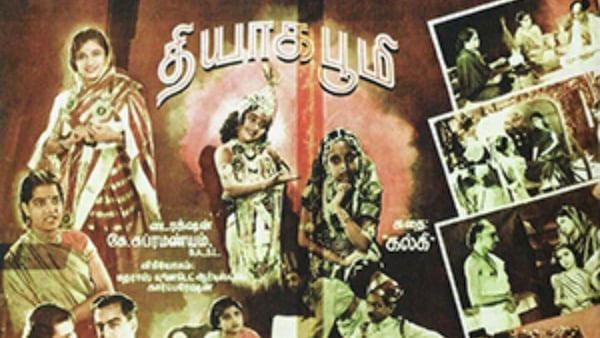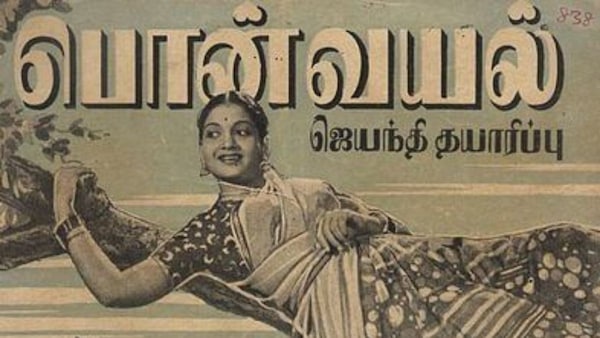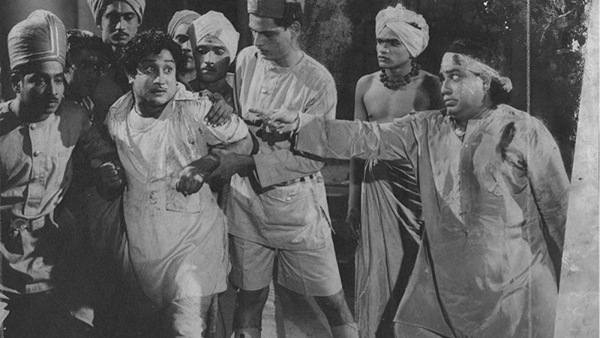Beyond Mani Ratnam’s Ponniyin Selvan: Kalki Krishnamurthy’s contribution to Tamil cinema
Ponniyin Selvan is not the first of Kalki Krishnamurthy’s works to be adapted to screen

Last Updated: 10.11 AM, Sep 27, 2022
While it is common knowledge that Mani Ratnam's much-anticipated Ponniyin Selvan: I (PS1) is based on Kalki Krishnamurthy‘s popular historical novel, not many know that it is not the first of the writer’s works to be adapted to screen. Krishnamurthy is known as the writer of Ellis R. Dungan's Meera (1945) which made M.S. Subbulakshmi a household name. His novels - Thyaga Bhoomi (1939), Kalvanin Kadhali (1955), Ponvayal (1954), and Parthiban Kanavu (1960) - are all different in genre but each of them carries the author’s distinctive voice in its adaptation from page to screen.

Thyaga Bhoomi (1939)
The orthodox community in a village is outraged when a compassionate landlord, Sambu Sastry (renowned Carnatic music composer and singer Papanasam Sivan) shelters a group of untouchables during a storm. He is forced to move to Madras, unaware that his pregnant daughter Savitri (S.D. Subbulakshmi) who lives in Calcutta, has been abandoned by her wealthy westernised husband, Sridharan (K.J. Mahadevan). Savitri reaches Madras and gives birth to a girl but finds it difficult to fend for herself and the infant. She finds her father but does not meet him. Instead, she leaves behind her child. Sastry decides to raise the baby without realising that she is his granddaughter. They live in a neighbourhood called Chavadikuppam which is socially backward.
A few years later, Charu (Baby Saroja), now an adorable and precocious child, charms an influential sophisticate, Uma Rani. Rani is, in fact, Savitri, who is now in better social circumstances. Sastry does not recognise his daughter, but Savitri realises Charu's identity and asks Sastry if she can raise her. When Savitrirefuses to return to their marriage, her husband files a legal case against her for restitution of conjugal rights. He even wins it but becomes remorseful. The couple dedicates their life to the betterment of society, and Charu returns to Chavadikuppam with her grandfather.
The performances may appear wooden, and accents, exaggerated, but Thyaga Bhoomi exemplifies the nationalist-themed movie in pre-Independent India with its character arcs.

Ponvayal (1954)
Based on Poimaan Karadu, a social novel narrated as a taut thriller, Ponvayal is about the self-made Sengodan (T.R. Ramachandran, also the producer of the movie), who owns a few acres of fertile land. His self-reliance also manifests in his calculative decisions and miserliness. While he loves Senba (Anjali Devi), he primarily regards her as a supporter in his attempts to save money to buy a coveted piece of land.
City slickers Esraj (K.A. Thangavelu), Bangaru (R.S. Manohar) and Pankaja (Mynavathi) befriend Sengodan, intending to take advantage of him. A murder occurs, and the mystery about the murderer and the victim is a trick of deception, much like the hill Poimaan Karadu near Salem where the play of light and shade creates a deer-like illusion.
Unfortunately, the movie is not available for online viewing, but one could presume that the characters of the cop (K. Sarangapani) and the actress (T.P. Muthulakshmi) are secret allies and well-wishers of Sengodan. And with T.R. Ramachandran as the protagonist, one could be sure that humour was an integral part of the adaptation.

Kalvanin Kadhali (1955)
Kalvanin Kadhali (translating to ‘the dacoit’s lover’) is about Muthayyan’s (Sivaji Ganesan) tendency to rash action and Kalyani’s (P. Bhanumathi) hot-headedness, which serve them in good stead individually against the world but are a threat to their future as a couple. When Muthayyan refuses to elope with her, Kalyani gives in to familial pressure and marries a much older person. In a fit of anger, she confesses to her husband, her unwillingness to be his wife. Her husband, in turn, regrets not seeking her consent for the wedding, and dies, but not before he annuls their marriage and changes their relationship to one of parent and child, bestowing her with the honour of being his heir.
Muthayyan, meanwhile, is branded a dangerous dacoit, and he takes advantage of the label to survive, so he can find his sister. Police inspector Saambu Sastry (K. Sarangapani) is tasked with finding Muthayyan. Kamalapathy (T.R. Ramachandran) who plays the role of women in stage plays, befriends Muthayyan, and the latter even hopes his sister would marry the young actor.
Muthayyan meets Kalyani again under new circumstances and decides to give up a life of crime. One day, when Kalyani sees Muthayyan embrace his friend Kamalapathy who is in drag as a female, she assumes it’s a paramour. To spite him, she blurts out his whereabouts to Inspector Sastry. Muthayyan tries to escape, but is shot and in his dying breath, calls her ‘the dacoit’s wife’. Kalyani too turns the gun on herself.
The story is remarkable for its shades of grey in the protagonists, and for the portrayal of the change in the relationship between Kalyani and her husband. It also depicts Kalyani’s prowess in managing her late husband’s estate. Sivaji Ganesan and Bhanumathi became what is considered a ‘hit pair’ and worked together in many movies through the 1950s and early 1960s. Both T.R. Ramachandran and K. Sarangapani played characters in Ponvayal and Kalvanin Kadhali.

Parthiban Kanavu (1960)
The Chola king, Parthiban (S.A. Ashokan) refuses to pay tributes to the Pallava emperor, Narasimhavarman (S.V. Ranga Rao). In the ensuing war, Parthiban is killed, but not before a mysterious Shivanadiyar (devotee of the god Shiva) promises him that his young son, Vikraman will be raised as a Chola warrior. In Vikraman’s growing years, the Shivanadiyar is an unstinting source of support to him and his mother.
Vikraman (Gemini Ganesh) vows to fulfil his father’s dream of an independent Chola empire but fails in his attempts after being betrayed by his wily uncle Marappa Bhupathy (T.S. Baliah). Vikraman is exiled to an island by the Pallava emperor, but unbeknownst to Vikraman, the young woman in Pallava land whom he fell in love with at first sight is Narasimhavarman’s daughter, Kundhavi (Vyjayanthimala).
Three years later, Vikraman returns in disguise to meet his mother but finds that she is being held captive by a gang of robbers who also perform human sacrifice. Vikraman is aided in his quest by his trusted boatman Ponna (S.V. Subbiah) and Ponna’s winsome wife, Valli (Ragini) who have discovered the identity of the Shivanadiyar.
Kundhavi tries to protect Vikraman from her father, the emperor, and after a series of twists and conspiracies, fights and rescues, Narasimhavarman and the Pallava court appreciate Vikraman’s valour and grant him his kingdom. The Shivanadiyar, whose identity the audience is already aware of, is finally revealed to Vikraman, Kundhavi and the entire Pallava royal court.
Ponniyin Selvan: I (PS1-2022)
Parthiban Kanavu was the last Tamil movie adapted from a Krishnamurthy story - 62 years ago! While many Tamil movie stalwarts have attempted to adapt Ponniyin Selvan to screen, few have succeeded.
Ponniyin Selvan is a palace intrigue story set in the Chola empire with a slew of interesting characters - warriors, allies, and conspirators. The novel is distinctive in its use of humour and its depiction of formidable women with their own character arcs and motivations. The beloved epic has a major fan following and has spawned numerous enactments on stage, reading clubs, online discussion groups, podcasts, and even historical tours of the region it is set in.
Now, with Mani Ratnam’s Ponniyin Selvan: I (PS1) gracing the marquee, one hopes to revisit the timelessness of Krishnamurthy’s tales featuring dauntless women protagonists and characters who are sometimes flawed, sometimes misguided, who conspire, abandon, thieve or kill, all narrated with a garnish of humour that completes the experience.
(Views expressed in this piece are those of the author, and do not necessarily represent those of OTTplay)
(Written by Saritha Rao Rayachoti)

